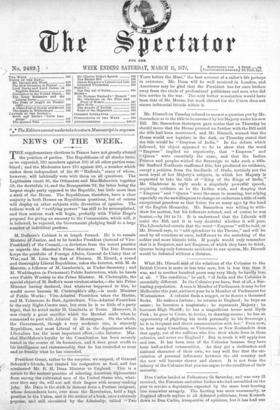What Mr. Disraeli said of the relations of the Colonies
to the British Crown is more or less true now, but is less true than it was, and in another hundred years may very likely be hardly true at all. " The condition," he said, " of India and the Colonies is essentially different. In the Colonies you have, first of all, a fluc- tuating population. A man is Member of Parliament, it may be for Melbourne this year, and next year he is Member of Parliament for Westminster. A colonist finds a nugget, or he fleeces a thousand flocks. He makes a fortune ; he returns to England ; he buys an Mate ; he becomes a magistrate ; he represents Majesty ; he becomes High Sheriff ; he has a magnificent house near Hyde Park ; he goes to Court, to levdes, to drawing-rooms ; he has an opportunity of plighting his troth personally to his Sovereign ; he is in frequent and direct communication with her." Even now, to how many Canadians, or Victorians, or New Zealanders does that apply, out of the millions who live their whole lives in these colonies, and never see England ? But in truth it will apply less and less. It has been true of the Colonies because they have been half-settled communities. As they get a civilisation and national character of their own, we may well fear that the cir- culation of personal influences between the old country and the new will become slower and slower. It is not from the infancy of the Colonies that you can argue to the condition of their maturity.


































